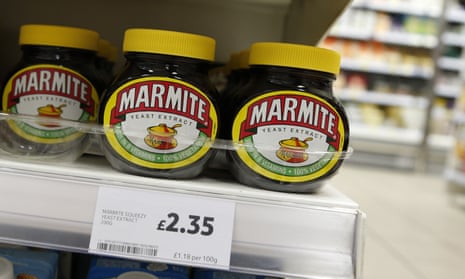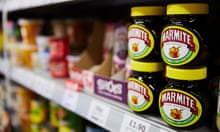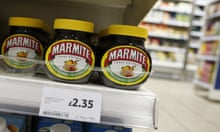When Marmite and PG Tips enter the Brexit wars, reality starts to bite – and sooner than expected. As David Davis was on his feet in the Commons on Wednesday, refusing to defend staying in the single market, the pound plunged again. Anyone changing their money at the airport today will find everything in Europe costing them 23% more than it did on 22 June.
Unilever says all its prices must rise by 10% – which is still less than the 15% fall in the pound, so expect worse to come. The Unilever spat with Tesco over who pays is just a sideshow, as other retailers warn of steep price rises, as we import so many essentials. BT’s chairman says imported phones and broadband hubs are already up 10%. Each day the Financial Times reports more banks declaring they are moving significant functions abroad, while car manufacturers look to invest elsewhere in the EU for their new models. As prices rise, the great majority of the population, whose incomes have been stagnant for nearly a decade, will see their living standards fall.
Thursday's Daily Mail -
— Nick Sutton (@suttonnick) October 12, 2016
Theresa: I'm siding with Britons who voted for Brexit#tomorrowspaperstoday #bbcpapers pic.twitter.com/lMSXuAt9yU
If this were a sterling crisis knowingly created by some extreme anti-business, ideologically-driven Labour government, the attacks on it from all sides would almost certainly see it fall. In contrast, the Daily Mail’s front page today is “Theresa: I’m siding with Britons who voted for Brexit”, as she warns MPs to “respect the will of the people and stop trying to halt Brexit”. The Express headlines, yet again, “Plot to betray EU exit voters”, after yesterday’s, “Forget angry remainers – slash ties with Brussels NOW”. The Sun’s take on the price rises is that it’s all the fault of “Brexit bandits”. “Remain-loving Unilever bosses threatened before the referendum to hike prices up if a Brexit vote won – in a bitter “extortion” tactic that will hit the pockets of hard-working Brits.”
As the real-world effect of leaving the EU begins, will there come a tipping point when these Brexit-deniers have to confront their reckless 20-year campaign to cut us off from our main markets? Probably not. Post-truth reporting will keep denying it, or will find other enemies to blame, preferably foreign (the Sun points out that Unilever is part Dutch). Meanwhile, Boris Johnson, appearing before the foreign affairs select committee, joins the outright, in-your-face deniers: ”Those who prophesied Brexit doom have been proved wrong.” So that’s all right then.
Could the time ever come when Rupert Murdoch or the Mail’s Paul Dacre might see the country facing such serious disaster that they decide to relent? Unlikely, as day after day they pretend that anyone who wants to stay in the single market is denying the referendum result. It was their non-stop pre-referendum migrant horror headlines that helped bring us to the point where an Ipsos Mori international poll today shows the British put worry about immigration higher (42%) than any of the other 25 countries polled, despite many other countries having far higher immigration rates. That’s the formidable challenge faced by “soft” Brexit advocates.
Every speaker in yesterday’s exceptional Commons debate confirmed we are leaving the EU. There is no “plot to betray” the referendum result. What was revealed was the extremists’ mania for an ever fiercer, harder Brexit: nothing will be enough for John Redwood, Bill Cash, Bernard Jenkin or Peter Bone who spoke out to back David Davis’s refusal to make the single market a priority. Any attempt to salvage favourable trading terms was denounced as anti-democratic treachery.
This is now the one great issue for the future of the country, overriding everything else, jumping party barriers as never before, forging some very strange alliances. The Tory “softs” in full throat gave a remarkable display of boldness: Dominic Grieve, Anna Soubry, Claire Perry, Chris Philp and, of course, Ken Clarke, were heroic in confronting their own front bench. Jeremy Corbyn used all six of his questions at prime minister’s questions to fire at Theresa May on Brexit, without drifting off-piste. Behind him suddenly there was a united Labour party, after Keir Starmer’s forensic opening onslaught. Nick Clegg hammered effectively. Nicola Sturgeon joins the same united battle to protect tariff-free trading, though her bombshell on another independence referendum undermines that unity of purpose. But in all, the common cause against May and her Brexiteers looks formidable – and this is just the start.
Today’s court case over parliament’s right to vote before triggering article 50 deserves to be won: if the referendum was about returning sovereignty to parliament, how odd to hear May and her team refusing it. But does it matter much? The majority in parliament is for remain, but what MP would dare vote down the referendum result?
Every day that passes shows how disastrous a referendum can be. Bad election results can be reclaimed by throwing the bastards out, but a referendum falls like a guillotine. Yet its terms were never defined. The public – as expressed inadequately in opinion polls – will have to decide how much pain they are willing to take in living standards for how much gain in migration control. The symbolism of the cost of Marmite may mark the beginning of a shift in people’s priorities. Any change in attitudes would strengthen the great new cross-party alliance trying to steer us to a soft landing and save us from shipwreck on the rocks of the Brexit fanatics.









